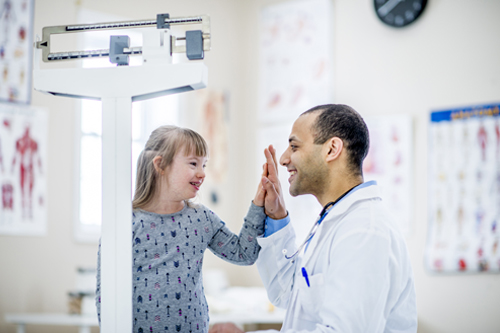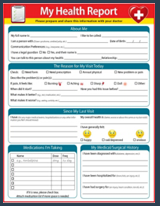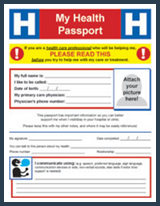Health
 About Health
About Health
The Florida Center for Inclusive Communities recognizes that good health is vital to enjoy all other life activities. People with developmental disabilities often have difficulty accessing appropriate high quality healthcare oftentimes because health care providers lack training or familiarity with the supports people with developmental disabilities need.
FCIC is addressing this issue by undertaking activities that either a) educate health care providers to be sensitive to special health needs of people with disabilities, or b) assist individuals and their caregivers to be proactive about knowing and communicating their own health needs across their lifespan. FCIC's health activities are coordinated by Elizabeth Perkins, PhD.
Health Resources Spotlight
Florida Resource Links
The National Disability Resource Collaborative
The National Disability Resource Collaborative is an initiative aimed at providing cross-disability information and support to Navigators and other enrollment specialists thereby ensuring people with disabilities receive accurate information when selecting and enrolling in insurance through the Affordable Care Act Marketplaces. The NDNRC website also has news, fact sheets, and other useful resources designed to support groups who are providing enrollment assistance to consumers with disabilities as they enroll for coverage through the ACA marketplaces.
Florida Office on Disability and Health
Florida was recently awarded a disability and health grant from the Centers for Disease Control and Prevention. This grant allowed for the creation of the, housed within the College of Public Health and Health Professions at the University of Florida. The establishment of the Florida Office on Disability and Health (FODH) in Florida will facilitate the movement toward continuity in care for people with disabilities and their families, serving as a centralized location for designing, implementing, monitoring, and evaluating programs and services. A major aim of the FODH will be to generate epidemiologically sound and consistent data on disability and health, using both new and existing sources of data, so that disability and health-related public health policies and programs within the state are data-driven, evidence-based best practices.
Association on University Centers on Disabilities - Healthcare
AUCD works on all of the issues encompassed in the very broad term "health care" for people with disabilities. Specific emphasis is placed on a community rather than institutional bias in affordable, equal access to health care. This includes private health insurance, public programs such as Medicaid and Medicare, managed care, as well as quality assurance and consumer education protections
FloridaHATS
Florida Health and Transition Services (FloridaHATS) is a collaborative program of the Florida Department of Health, the Children’s Medical Services Network, the Florida Developmental Disabilities Council, and other partners throughout the state.
FloridaHATS’ mission is to ensure successful transition from pediatric to adult health care for all youth and young adults in Florida, including those with disabilities, chronic health conditions or other special health care needs.
Center for Disease Control and Prevention (CDC)
CDC is one of the major operating components of the Department of Health and Human Services. CDC works 24/7 to protect America from health, safety and security threats, both foreign and in the U.S. Whether diseases start at home or abroad, are chronic or acute, curable or preventable, human error or deliberate attack, CDC fights disease and supports communities and citizens to do the same.
Disability Rights Florida
Disability Rights Florida is the designated protection and advocacy system for individuals with disabilities in the State of Florida. Their mission is to advance the quality of life, dignity, equality, self-determination, and freedom of choice of persons with disabilities through collaboration, education, advocacy, as well as legal and legislative strategies.
- COVID-19: As we all do our best to protect the health and well-being of our families, friends, and ourselves in this unsettling time, Disability Rights Florida ensures that information about COVID-19 is made fully accessible to everyone. The following resources and materials help individuals with disabilities gain access to vital information regarding disability-specific issues and COVID-19.
- COVID-19 Vaccine Assistance: It is vital to remove barriers to accessible vaccines and to encourage vaccinations among people with disabilities through education. Disability Rights Florida has created and maintains a list of resources that were designed to improve the self-advocacy skills of people with disabilities and their ability to receive the COVID-19 vaccine in a timely manner.
- Healthcare & Medicaid: Advocating for oneself when appealing an agency’s denial or reduction of Medicaid services is just one of the many ways an individual can increase their ability to gain access to affordable, quality, and accessible medical care. Disability Rights Florida provides a substantial number of resources and materials that help people with disabilities learn more about Medicaid and health-care advance directives.
- Mental Health: Learning how to identify the warning signs of issues concerning mental health can lead to a faster diagnosis and treatment. Helping yourself as well as others by preventing social isolation and other complications can ultimately save lives. Disability Rights Florida offers a wide range of resources that are regularly made available to help improve the mental health and well-being of people with disabilities, their families, and caregivers.



